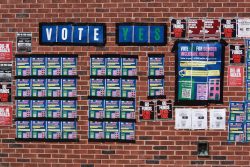The Britney concert sold out before you realized she was coming to town. Dad wouldn’t let you charge those Caps tickets on his American Express. For whatever reason, you find yourself ticketless, standing in front of the MCI Center, talking to a guy on the sidewalk who is offering you decent seats for five bucks over what you would have paid at the box office. You gladly fork over the cash and head inside. He’s happy. You’re happy. Is there anything wrong with this picture?
According to some D.C. Council members and local stadium executives, there is. Council members Sharon Ambrose (D-Ward 6) and Jack Evans (D-Ward 2) are sponsoring a bill that would drastically increase fines for reselling tickets above their face value?up to $700 for a first offense and $1,500 for a third offense. Currently, there is no law in D.C banning ticket scalping, but scalpers face a $50 fine for selling merchandise on the street without a license.
Why the sudden crackdown? With ticket prices for sporting events steadily rising, executives at the MCI Center say they are pushing the pricier seats by marketing these events as family entertainment. Encountering aggressive scalpers mars the family fun, according to Matt Williams, a spokesman for Washington Sports and Entertainment, which owns the MCI Center, the Wizards and the Mystics. “People are uncomfortable [with scalpers], ” Williams told the Washington Post. “We want our patrons to feel … that it’s safe to come to the game.” But the proposed bill would not only eliminate an experience as essential to many stadium-goers as overpriced beer, but would also fail to resolve the issues Williams raises.
Teams sell many of their best seats to corporations or licensed brokers, and tickets sell out in minutes online. For the average fan, buying from a street-level scalper is often the only way to catch Peter Bondra or Michael Jordan in action. And the proposed bill wouldn’t just affect basketball fans. Stadium executives are most concerned about the presence of scalpers at large, family-oriented sporting events, but the bill would also outlaw scalping at events like rock concerts, where the main audience of young adults couldn’t care less if they have to elbow their way past a crowd of scalpers to get to the door.
And banning the resale of tickets for more than their face value still won’t eliminate scalpers. They often buy tickets from fans who are getting rid of extra seats at well below the box office price. They resell the tickets at a profit, but still under face value. Under the new legislation, this would be legal, and most scalpers would surely stick around. If stadium executives want to control the atmosphere at their venues, a better idea would be to set up limited areas where scalping is legal. That way, scalpers are easy for ticket-hunters to find, but timid families and corporate bigwigs can avoid the commotion.
Most importantly, sting operations against scalpers would be a huge waste of police resources. Surely the already overloaded Metropolitan Police Department has more important things to do with its officers on a Friday night than round up scalpers and issue fines outside the MCI Center. As far as safety threats in downtown Washington go, scalpers are near the bottom of the list, no matter what Williams says.
The proposed legislation against scalping is both detrimental and ineffective. Scalpers offer a valuable service to the common sports or music fan at an ultimately minimal inconvenience to stadium patrons. Perhaps MCI Center executives should just use the back door from now on.




